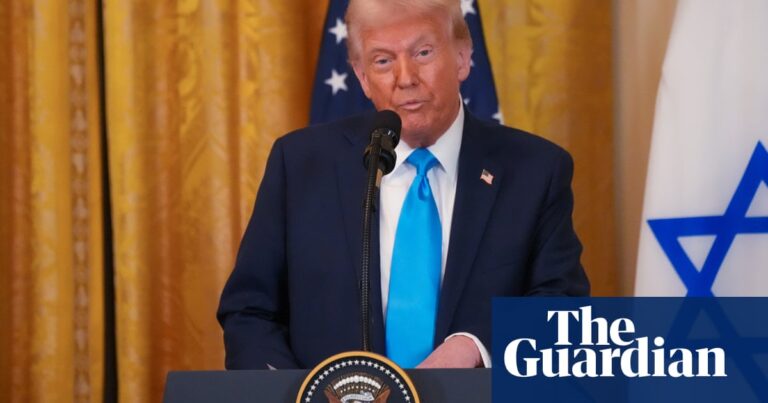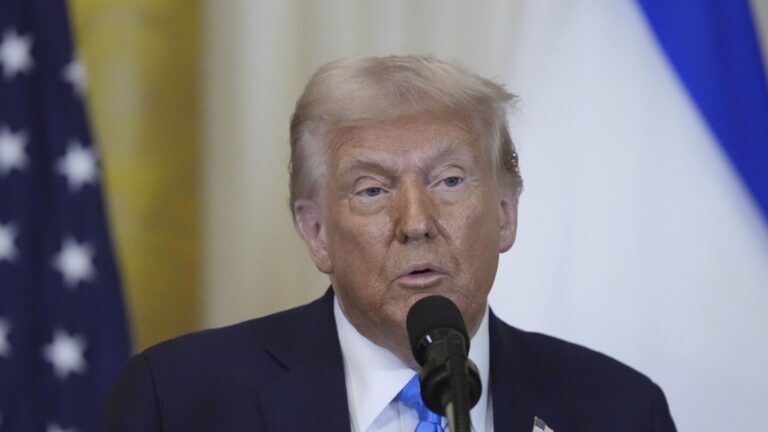
On Monday’s episode of The Excerpt podcast: High winds are expected to complicate firefighting efforts in California this week. Plus, groups rescue dozens of animals from fire-ravaged areas. USA TODAY Chief Political Correspondent Phillip M. Bailey breaks down the race for the next Democratic party chair. President Joe Biden spoke Sunday with Israeli Prime Minister Benjamin Netanyahu, amid cease-fire talks. USA TODAY Reporter Andrea Riquier takes a look at the future of the Consumer Financial Protection Bureau.
Hit play on the player below to hear the podcast and follow along with the transcript beneath it. This transcript was automatically generated, and then edited for clarity in its current form. There may be some differences between the audio and the text.
Podcasts: True crime, in-depth interviews and more USA TODAY podcasts right here
Taylor Wilson:
Good morning. I’m Taylor Wilson, and today is Monday, January 13th, 2025. This is The Excerpt.
Today, what this week’s wins could mean for California fires. Plus we take a look at the race for the next Democratic Party chair and what’s next for the Consumer Financial Protection Bureau.
♦
At least 24 people have now been killed on top of the more than 12,000 structures destroyed in Southern California wildfires. The Palisades Fire, the most destructive in the history of Los Angeles, has scorched over 23,000 acres, destroying homes, businesses, and landmarks.
It’s now 13% contained, and officials acknowledged that progress had been made, but warned resurging winds could complicate efforts and enhance the risk level. Santa Ana winds that have fueled the blazes for the past week were expected to strengthen overnight with some of the strongest winds of the week coming tomorrow.
Meanwhile, dozens of animals were rescued and transported from fire-ravaged areas in Los Angeles County to other cities in California like San Diego and Sacramento. Amid the fires, the San Diego Humane Society and Sacramento SPCA stepped up to rescue animals at Pasadena Humane and other local shelters. You can read more about those efforts with the link in today’s show notes and stick with usatoday.com for more fire updates.
♦
Democrats are picking a new party chair. For more on what that actually means and a closer look at their priorities in the wake of last fall’s election losses, I caught up with USA TODAY Chief Political Correspondent Phillip M. Bailey. Hello, Phillip.
Phillip M. Bailey:
Hey, Taylor. How are you doing?
Taylor Wilson:
Good, good. Thanks for hopping on today, Phillip. So could you just start, before we talk about this race for the next chair, tell us a little bit about Jaime Harrison, the outgoing DNC chair.
Phillip M. Bailey:
Well look, Jaime Harrison, when he ran for US Senate out of South Carolina, was a fundraising powerhouse, has been at the head of the Democratic National Committee since then, has led it through some successes and obviously some failures.
And I think after Vice President Kamala Harris lost the presidential election and Democrats also lost the US Senate, I think there was an expectation, and this usually happens when the party that’s out of power, there’s usually a shift or change of leadership at the party level as well. I haven’t seen any sort of grassroots or even establishment reaction in saying that Harrison was a failure as a DNC chair. I think far from that when you look at his record.
But the Democrats are going to be in the wilderness, and I think that Harrison understood that now is probably the best time to move away from the DNC and that to have another generation or another group of folks have a crack at it, but I certainly don’t think we’ve seen the last of Jaime Harrison in democratic politics.
Taylor Wilson:
Okay, interesting. So in terms of who’s running to replace him or hoping to replace him, who are the front-runners here, Phillip, and who are some of the other contenders you’re keeping an eye on?
Phillip M. Bailey:
We’re going to have an election on February 1st at the Democratic winter meeting. But as far as the candidates who are in the race now, you have Wisconsin Democratic Party Chair Ben Wikler, who has gotten the support from a wider range of groups like MoveOn and Progressive Change Campaign Committee, which are on the left, but then also centrist groups like Third Way are endorsing him for DNC chair.
You also have Minnesota Democratic-Farmer-Labor Party Chair Ken Martin, who is very well-known among other state party chairs. He has gotten the endorsement from the delegations from Missouri, South Dakota, Tennessee, Oklahoma. Former Governor of Maryland Martin O’Malley, who left the Biden administration, he’s been endorsed by members of the Congressional Black Caucus such as Former HUD Secretary Marcia Fudge and Representative Bennie Thompson.
And we have some other lesser-known candidates, including probably the most aggressive, I think, candidate in this race is a New York State senator named James Skoufis. He claims to have the support of at least 23 DNC members. He’s been a very aggressive candidate here, so suddenly calling out some of his competitors in this.
But you also have some lesser-known candidates who are on some long-shot lists. Marianne Williamson, the author and former presidential candidate. Nate Snyder, a former U.S. Department of Homeland Security official. Quintessa Hathaway, former congressional candidate out of Arkansas. And Jason Paul, a Massachusetts attorney.
Taylor Wilson:
You touched on this a bit, Phillip, but can you just really help us understand this moment the party is in two months after a brutal election loss to Donald Trump? They’ve ceded control to Republicans on Capitol Hill. I mean, what really are the kind of short-term immediate priorities for Democrats as they try to navigate this new era?
Phillip M. Bailey:
Look, Democrats are going to be completely out of power, and they’ve been here before. After the 2004 election when George W. Bush was reelected, they were completely out of power. You had a situation similar in 2016 after Hillary Clinton lost to Donald Trump the first time around.
So look, Trump’s coming back to Washington, not just is he returning to Washington, but he is returning with a political trifecta. He’s going to have the White House, he’s going to have the Senate, he’s going to have the House of Representatives, and some would even argue that the Conservative movements to take over Washington includes the US Supreme Court, which is a more Conservative tilt court in this current time in our country’s history.
For Democrats, that means restarting from really ground zero, right? So for Democrats, there is a conversation going on of what went wrong in 2024? What do we have to look forward to in 2025 and 2026? And also I think a ongoing conversation about how much you want to see Democrats, they want to cooperate or resist Donald Trump. Democrats are really trying to find themselves again here after a loss.
I think what’s interesting about this DNC chair race is that it’s not turned into this ideological battle that many of us thought was going to happen in the immediate knee-jerk reaction to Harris’s loss. It’s really a nice guy fight between Wikler and Martin mostly, but I think you’ll see those other candidates maybe try to jump in and jump the line with some more interesting positions or viewpoints.
Taylor Wilson:
Phillip, how much does a party chair matter? I mean, what does this job actually entail functionally?
Phillip M. Bailey:
Without a House speaker, without a Senate majority leader, without a president, this individual is going to be the face of this political party. So it’s going to be fundraising, it’s going to be recruiting candidates, it’s going to be helping with crafting messaging, selling really the Democratic brand to the rest of the country.
So this is an important position, but it’s also a very difficult and thankless position sometimes. The Democratic Party, like all political parties, have a big tent, they have different factions, they have different motivations and different responsibilities and different people that they think are the best person to represent the party. This is not going to be easy.
And I think what’s been surprising is that this DNC chair race has not really gained a lot of attention among Democrats. There are many folks who I speak with, top Democrats, regular rank-and-file activist types who said there’s not a whole lot of interest in this. In fact, I think a lot of Democrats may have hit the snooze button on this race. That may change in the next week or so, particularly with President Trump’s inauguration coming on January 20th.
Taylor Wilson:
All right. Helpful explainer for us as always. Phillip M. Bailey is USA TODAY’s chief political correspondent. Thank you, sir.
Phillip M. Bailey:
Taylor, thank you as always. Merry New Year.
♦
Taylor Wilson:
President Joe Biden yesterday spoke with Israeli Prime Minister Benjamin Netanyahu. The pair discussed efforts underway to reach a deal to halt the violence in Gaza and free the remaining 98 hostages held there, the White House confirmed to Reuters.
Netanyahu said in a statement that he updated Biden on progress and on the mandate he has given his top-level security delegation now in Qatar in order to advance a hostage deal. National Security Advisor Jake Sullivan told CNN’s State of the Union yesterday that the parties were very, very close to reaching a deal, but still had to get it across the finish line.
♦
The Consumer Financial Protection Bureau, or CFPB, has been a political punching bag for years and is under fresh attacks in recent months, but it might survive a new Trump administration. I spoke with USA TODAY Reporter Andrea Riquier for more.
Hello, Andrea. Thanks for hopping on on this.
Andrea Riquier:
Hi, Taylor. Nice to be with you.
Taylor Wilson:
It is nice to be with you. So I just want to start with some basics. What is the Consumer Financial Protection Bureau for folks not familiar?
Andrea Riquier:
So the CFPB is an agency that was founded after the financial crisis of 2008. It was designed to fill a gap in regulatory agencies whereby there really was no agency that was dedicated to consumer finance. There are agencies that oversee air travel, groceries, medicines, all sorts of things, but not consumer finance, mortgages, bank accounts, credit cards, student loans, things like that. It was founded as part of the Dodd-Frank Act.
Taylor Wilson:
Okay. So how does it really help consumers then specifically? What does it get into?
Andrea Riquier:
It works through a couple of different mechanisms. One thing that it does is that it writes rules. So for example, it has recently been involved in writing a lot of rules that have to do with junk fees, fees that financial companies will tack on if you’re taking out a mortgage, if you are late on your credit card payment, whatever.
Just to clarify, when we talk about junk fees, the CFPB isn’t saying that this company cannot assess any fee for a consumer who’s late, but just excessive fees, fees that are maybe not transparent, fees that may actually even be illegal under previous laws. So it writes those rules.
It also takes consumer complaints. So if you have a really bad experience with, again, a bank, a credit card company, whatever it is, you can call the CFPB and it will be documented. Whether the CFPB then acts on your complaint is another question. The CFPB is not a mediator that you can call and get them to act on your behalf, but it will document complaints.
It actually does a lot of really good personal finance education. So if you want to understand anything about the mortgage process, credit cards, taking out a loan, insurance, things like that, they have a lot of really good material online. And those are sort of the major ways that they work.
Taylor Wilson:
All right. So we’ve had a lot of talk in recent months about government bloat and kind of getting rid of it under the next Trump administration. Elon Musk, Trump advisor, has been at the heart of a lot of this talk, Andrea.
What has he said about the CFPB? And really, is there a current push for this among some of those in Donald Trump’s orbit, maybe getting rid of it? Where does that conversation stand?
Andrea Riquier:
So he tweeted shortly after the election that he thought the CFPB should be, quote, unquote, “deleted.” And he added his thought that the CFPB is one of many duplicative agencies.
The irony is that the CFPB is the opposite of duplicative. There was nothing like it before it existed. Some of the regulation and sort of oversight that it does now were siphoned off of other existing agencies and wrapped into this new agency that was created, again, after the financial crisis.
So getting rid of it would not remove bloat, it would get rid of something that has been really, really helpful for consumers. It has returned $21 billion plus to average consumers. They estimate over 200 million consumers have received that money.
Going after these companies that are doing bad things to consumers in the financial marketplace, one of the biggest successes that it has had was the Wells Fargo scandal. The CFPB was the one that sort of figured that out. Wells Fargo, you probably remember, was opening fake accounts under customers’ names. So customers who were harmed by that got money when the CFPB fined Wells Fargo. And that goes on a lot.
So as far as deleting the CFPB, it would not reduce government bloat, it might reduce government, but whether or not it’s a good idea to reduce government overall by getting rid of an agency that has done good for consumers in the face of financial products companies which have the ability to really harm ordinary Americans. If you take out a mortgage and you have a problem, you could lose your home. If you have a problem with debt, you could wind up in bankruptcy. There are serious consequences to getting into trouble in financial services and with financial products.
Taylor Wilson:
And is there any firm sense from Trump himself, Andrea, on this issue?
Andrea Riquier:
There is no firm sense. Unfortunately, the transition team did not respond to our request for a conversation about it. We know that the CFPB was also mentioned in the policy document called Project 2025, which was produced by The Heritage Foundation. I reached out to The Heritage Foundation as well. They did not comment.
We don’t know what’s going to happen. The CFPB does not have a household name. It’s not well-known. Know it here, government regulator, maybe that sounds bureaucratic. Maybe it just sounds by its nature like it could be bloat. Maybe there won’t be a sort of a groundswell of support for it. But the people that I talk to think that it has done enough good. Having an agency that does advocate on behalf of the ordinary person when it comes to Wall Street is not a bad thing.
Taylor Wilson:
Andrea Riquier, a helpful breakdown for us. As always, folks can go find the full piece with the link in today’s show notes. Thank you, Andrea.
Andrea Riquier:
Thank you, Taylor.
♦
Taylor Wilson:
Thanks for listening to The Excerpt. You can get the podcast wherever you get your audio. And if you’re on a smart speaker, just ask for The Excerpt. I’m Taylor Wilson and I’ll be back tomorrow with more of The Excerpt from USA TODAY.



